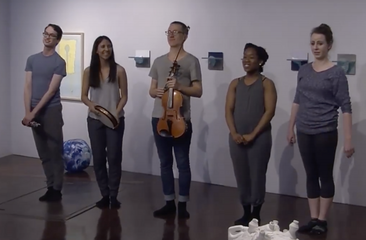 Black Sheep Contemporary Ensemble Black Sheep Contemporary Ensemble
What is the Black Sheep Contemporary Ensemble?
Black Sheep Contemporary Ensemble is a new music group focused on performing music by living composers, commissioning new works, interdisciplinary collaboration, and educating audiences about new music. Since forming in 2014, the ensemble has performed with visual artists, dancers, and choreographers to create new, often site specific works. BSCE has commissioned and premiered multiple new pieces while also giving repeat performances to works by living composers worldwide. Our instrumentation is fluid, consisting of our four core members Nicole DeMaio, Bradley Frizzell, Emma Staudacher, and Aaron Smith, alongside a varying number of invited guests. We alter the instrumentation of the group based on the specific needs of each performance, but you’re likely to see several guests join us for multiple performances within a season. All of our core members perform with the ensemble and also hold administrative positions, like Nicole who is our Director and Bradley who runs our Outreach Program. How did you all meet and being playing music together? The ensemble actually first started out as a bass clarinet and tuba duo with myself (Nicole) and Liam Sheehy. We met at Montclair State University in New Jersey when I was working on my bachelors degree and Liam was getting his masters. After graduation we both ended up moving to Boston. I was starting my masters at The Boston Conservatory and Liam, a Massachusetts native, moved back and started working in the city. When I started at BoCo, I quickly realized I wouldn’t have many performance opportunities since I was majoring in composition. I decided the best solution was to start my own group, and thus, Black Sheep was born. I asked Liam to join because I knew he was interested in contemporary music and I liked the unusual instrument combination. Our first concert involved commissioning a handful of BoCo composition students to write us pieces and was held in one of the school’s performance halls. After graduating, I decided to expand the duo into an ensemble to help avoid always needing to commission new pieces. Emma and I both graduated together, and I knew that she was interested in new music, so she was the first person that I asked to become a core member. Bradley performed with us at our first Boston Sculptors Gallery show in 2016, and became a member and our Community Outreach Coordinator shortly afterwards. Aaron and I met at a BSO concert, and now handles all of our technology and viola related needs. How do you go about programming? Do you commission a lot of new works in addition to existing pieces in the repertoire? Programming for our ensemble varies from selecting works for a traditional concert to composing all new music for a site-specific event. For our concerts, we used to hold Calls for Submissions throughout the year, but have since switched to an open submission forum that any composer can add to for free. We accept a variety of new works, previously performed pieces, and proposals for new pieces to be written for us. One of our goals is to program works that have already been performed, as many other groups focus primarily on premiers and commissions. To decide the instrumentation for a concert we first pick one larger work, one that includes some of our core member’s instruments, and then select other pieces based on that. Do you have any other special considerations in terms of programming? Do you like to perform at certain kinds of venues, involve technology and other media, etc.? Our programming varies from concert to concert. A lot of what we do is based on the space and the type of concert we want to put on. Some concerts feature traditionally composed pieces while other concerts will be programmed with electronics or other non-traditional aspects in mind. We have done performances featuring things like sculptures, interactive light suits, dancers, iPads that audience members can control, or improvisation. Sometimes the music we pick is based off of artwork inside the space we are performing, or we might focus on a particular composer’s body of works that we feel have been overlooked. Intersectionality and representation of marginalized voices is a topic (and issue) of contemporary music that is being discussed more these days. How do you feel about this, and is this a concern (or perhaps a goal) in terms of concert programming and commissioning? We feel that the representation of marginalized voices in music is a subject that everyone should be concerned about. So many chamber groups and orchestras only play music from a small category of composers. Black Sheep Contemporary Ensemble has made it one of our priorities to be a champion for women and POC in contemporary classical music. There are many wonderful voices out there that just need a proper opportunity to be heard. We recently commissioned four composers to write new works for our core instrumentation, three of whom identify as female. Your website mentions that you also enjoy interdisciplinary collaboration. Could you talk a little more about that and maybe about some of the work that has come from those projects? Many of our projects include interdisciplinary collaboration. One of our most frequented venues is Boston Sculptors Gallery. The performances always combine sculpture, music dance, choreography, and composition. We perform music specially composed for the occasion, written by members of the ensemble. All of the music is based off of the sculptures that inhabited the space. We then in turn created choreography that connected with the music and artwork. After our first performance at BSG, we’ve ended up performing at several more galleries throughout Boston and have expanded to New Jersey and Rhode Island venues as well. One main goal of our ensemble is to create true interdisciplinary collaborations. We have no wish to create concerts that are just musicians playing music next to dancers with paintings in the background. That isn’t really collaboration, it’s just three things happening at the same time. We create works in which all the arts are influencing each other. Often times we even switch roles between the performers; musicians dance while playing, dancers sing while dancing, and everyone helps compose and choreograph. If we are performing with visual artists we try to keep an open dialogue with them during the compositional process to ensure that there is a mutual understanding of the artwork and the ensuing composition. What, as an ensemble, has been a highlight of your career performing together? One of our favorite moments came from our concert back in December of 2018. The crowd for that show was fairly small, and we felt a little disappointed that more people hadn’t come out. After the performance, an audience member came up to us and complimented us on our programming choices and the effectiveness of our works that incorporated dance and visual art. He said something along the lines of “I’ve been following you guys online for a while, and what I saw tonight was really unique. There’s a lot of new music happening in Boston and this was refreshingly different.” Getting feedback like that makes you feel proud of what you’ve invested your time into. We loved knowing our audience, no matter how small, enjoyed what they had seen and heard that evening. Do you have any long-term major goals you are working towards? Maybe a large-scale collaboration with a composer, concert series, or something else entirely? We are currently working on commissioning a new micro-opera to be paired with one that is already composed. We’re aiming to have the performances in Spring of 2021. Our big hope is to perform the work both in Boston and New York. Our biggest struggle has been to get enough funding to travel and perform the same musical program multiple times. We are also in the middle of a collaboration with an author to create a new piece for children through our Community Outreach sector, but can’t talk details just yet. What projects do you have in the works right now? Our focus now is on the other two performances this season, one of which will be in Providence. I’ll be working with Aaron and Bradley to create a new, evening length work which will be premiered at AS220 on March 8th at 2:00pm. We’re hoping to bring that performance to NYC, NJ, and beyond. We’ll also be presenting a traditional concert of new works with exact dates and times to be announced soon. Again, if we can get the funding, this concert will happen several times in multiple locations. Follow the links below for more information about Black Sheep Contemporary Ensemble: Website: https://www.blacksheepcontemporary.com/ Youtube Channel: https://www.youtube.com/channel/UCAG3_uoJpmyvuucGjmI0rKQ/videos Below are video samples of Black Sheep Contemporary Ensemble
Short collage video of highlight performances by BSCE
Extended video of performance at the Boston Sculptures Gallery in 2018
0 Comments
Leave a Reply. |
Early Reflections contains interviews with emerging and currently active composers. Check out the archives to see a list of previous interviewees!
Full Directory of Interviews |

